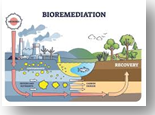i INP-WEALTHPK
Faiza Tehseen

Bioremediation techniques are crucial to be introduced in Pakistan to address the environmental challenges.
“Bioremediation is a cost-effective and sustainable solution to curb soil pollution, treat contaminated water sources, and ensure safe disposal of hazardous waste,” explains Muhammad Saleem, spokesperson of the Ministry of Climate Change and Environmental Coordination.
Talking to WealthPK, he said: “Rapid urbanisation, industrial expansion, and insufficient waste management infrastructure are increasing pollution. Industrial waste is one of the primary contributors to water contamination. Overuse of chemical fertilizers and pesticides is a major cause of soil contamination, especially in agricultural areas. To clean water and soil from the contaminations, incineration or chemical treatments are not only costly but also harmful to human health.”
He said that bioremediation is the best natural and sustainable environmental recovery tool to yield long-term results. “Unlike other clean-up technologies, not much expensive infrastructure or chemicals are required for adopting bioremediation as this technique relies on locally available microorganisms and plants to reduce the need for expensive interventions.”
Saleem said: “Rapid adoption of bioremediation will generate employment opportunities in rural areas, particularly in the agriculture sector.”
He said that inadequate infrastructure, lack of research funding, and limited awareness of technology were major hurdles to adopting the ecofriendly bioremediation technology.
“Though bioremediation helps detoxify various chemicals from land and water, it is not suitable for all pollution types – highly toxic or persistent chemicals – which are not easy to break by using microorganisms.
The ministry official said: “Increased investment in research and development, and raising public awareness will play a crucial role in widespread adoption of this technology.” He said all relevant government agencies, private sector and other stakeholders should join hands to make bioremediation a mainstream solution to environmental challenges.
Meanwhile, talking to WealthPK, Dr Riffat Tahira, principal scientist at the National Agricultural Research Centre, said that bioremediation uses microorganisms, primarily bacteria or fungi, to biologically degrade pollutants into less toxic substances.
She said that biological agents, including plants and microbes, are used to remove or lessen the effects of environmental pollutants. “Microbes are more intensely used than plants primarily due to their rapid growth and ease of manipulation.”
Tahira said: “Different types of bioremediation techniques are used, including ‘in situ’, ‘ex situ’, bio-augmentation, and bio-stimulation, to help reduce the environmental pollution. These techniques are instrumental in cleaning up soils, industrial waste, groundwater, pesticides, organic pollutants, and oil spills.”
In the United States, bioremediation is successfully used to treat the oil spills, while in India, plants are employed to remove heavy metals from contaminated soils.
Credit: INP-WealthPk









